The Struggle for European Private Law
A Critique of Codification
Samenvatting
This new reading renders the European codification project (currently being promoted through the common frame of reference and the optional sales law code proposal) vulnerable to constitutionally grounded criticism, traceable to normative considerations of private law authority and legitimacy.
Leone Niglia reconstructs the European codification project as a complex structure of government-in-the-making that embodies a set of contingent worldviews, excludes alternatives, challenges the plurality of private laws and entrenches conflicts that pertain not only to form (codification, de-codification, recodification) but also to dilemmas implicated in determining the substantive orientation of European private law.
The book investigates the position of the codifiers and their discontents in the shadow of the codification strategy pursued by the European Commission – noting a new turn in the struggle over the configuration of private law that has taken place since the age of codification.
Specificaties
Inhoudsopgave
Prologue 1
I . An Argument 1
II . Structure 4
1 Code 7
I . Advent of the European Code Project (1989 to Today) 7
II . Portraying the European Code Project 9
III . Genealogy of the European Code-Text: Of Continuity and Discontinuity in European Legal Thought from Lando’s
Principles to the DCFR 10
A . The Great Convergence of Acquis Commun and Acquis Communautaire 15
B. Advent of the Principles 20
IV . F unction of the European Code-Text. The Return of Code-based Universalisation and Disciplining 26
A . The Proposed Code as a Device for Law’s Universalisation 26
B. The Proposed Code as a Device for Law’s Disciplining 28
V . O n the Need to Explore the Codification Phenomenon from the Perspective of the Wider Range of Jurisprudential Forces 36
2 Jurisprudence 42
I . Introduction 42
II . Development of a Pluralist Private Law out of Classical Jurisprudence 47
A . Turning Points in History: Politicisation Processes in the Twentieth Century 48
B. Into Politicisation I: Of Agency and Techniques (the Legislative Branch) 52
C. Into Politicisation II: Of Agency and Techniques (Jurisprudential Vocabularies) 60
III . Pluralism Beyond the State: The Development of a European Private Law Jurisprudence out of Domestic Structures 65
A . Constitutional Private Law I: ‘Low Intensity’ 69
B. Constitutional Private Law II: ‘High Intensity’ 72
3 Code vs Jurisprudence 78
I . Regimenting the Living Jurisprudence qua Europe’s Constitutional Pluralism 85
A . Mandatory Rules 87
B. Default Rules 95
C. Choice 98
D. Further Criticism Towards the Proposed Optional Code – The Code vs Parliaments 102
II . Synthesis of the Constitutional Critique 104
A . De-constitutionalising Private Law 105
B. Re-constitutionalising Private Law 107
4 Jurisprudence vs Jurisprudence 111
I . Introduction: The View from Jurisprudence 111
A . Code as Nomos: The Jurisprudential Movement behind Codification 118
B. Code as Thesis: The View from the Legislature 127
C. Code as Nomos-and-Thesis Phenomenon: Between Jurisprudence and Legislation 139
D. Divided Nomos: Jurisprudence versus Jurisprudence 148
II . Conclusion 153
Epilogue 154
I . Of Codification and Critique 154
II . Of Codification and its Poverty 159
Bibliography 167
Index 179







